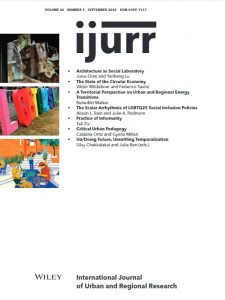Drawing upon three years of ethnographic research conducted in drug and alcohol recovery houses and treatment centers in Philadelphia, this article argues that attending to the practice of informality in the subproletariat and precarious working classes of the postindustrial US city helps elucidate the twinned legacies of informality and surveillance in racialized US urban poverty. To do so, it recuperates Bourdieu’s practice theory with the invigorating insights of Black studies on the historic legacies of racializing surveillance to theorize the practice of informality in the postindustrial US city. Ultimately, the article argues that informal practice offers a space of concealment forged through the evasion and countersurveillance of racializing surveillance in the postindustrial US city.
Details
Written by:
Tali Ziv
Digital Object Identifier (DOI)
https://doi.org/10.1111/1468-2427.13134
About DOI

